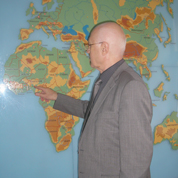Nigeria has abundance of capital-intensive projects for years to come

It is a well-known fact that your company has a long track record of working in Nigeria. In this regard, what is your general impression of working in this country?
According to the intergovernmental agreement signed between our countries, Zarubezhstroimontazh was involved in the construction of Ajaokuta Steel Complex Ltd. from 1980s till 1995. The relationships developed over this period with our Nigerian partners and employees were perfect. Indeed, many of our Nigerian employees did so well that we later made them foremen of their departments. Therefore, my overall impression was totally positive. When we left the country in 1995 due to lack of financing of the factory construction by the government, Solgas Energy, a U.S. company, signed a new agreement with the government to complete the construction. However, taking into account the fact that no one knows this project better than us, Solgas Energy management approached us with a proposal to come back and help finish the project. Later, then-president of Nigeria received me and Solgas Energy chairman & CEO Thomas Russell, who, after lengthy negotiations, endorsed the project, thus opening the way for penning a new, $300mln contract for the completion of the project. However, after waiting in vain for the promised down payment from Solgas, we decided to pull out of the contract.
If there is a possibility for you to work on this object or other projects again in Nigeria will you be willing to return to the country, and if yes, on what terms?
We often receive phone calls in our Moscow office from our Nigerian partners asking if we are ready to return and continue our work if their government decides to re-launch the plant construction. Our answer is yes. We are ready to go back, because we were involved in the design, supply of most equipment, and finally, we know this project perfectly well. Our single condition is a guaranty of reliable funding for the project.
Briefly put, how you characterize the prevailing investment climate in Nigeria?
I would like to start by noting that Nigeria’s investment potential is huge. For instance, the country’s sphere of infrastructure developments is ‘like an uncultivated land’ with abundance of opportunities. There ere enough capital-intensive investment projects for developers in the country. We are often approached by Nigerian business owners asking us to help design various projects. Just recently, we got a proposal to design an oil refinery plant with a projected production capacity of 6mln barrels.
“The relations that developed between us, our Nigerian partners and employees, when we were working on the construction of the Ajaokuta Steel Complex Ltd., were excellent.”
We accepted the proposal, sent some materials, demanded that the project be owned by a western investor. Why not a Nigerian? This is because we don’t see such a local company capable of bankrolling such huge capital-intensive projects in the country. Indeed, we regularly receive information about attractive project opportunities in Nigeria from our partners. But we are ready to participate in all appropriate projects in the country only as a construction company without investing our private funds into such projects.
What recommendations would you give to Russian investors/companies if they approach you for advice regarding doing business in Nigeria?
Today, several Russian companies are successfully working in Nigeria, while others have tried and/or considering the possibility of doing so. Indeed, some companies do ask us for advice before entering the Nigerian market, and we always give them consultations on the conditions and methods of doing business in the country. Put briefly, we always tell them that it is possible to work normally in Nigeria, that the local population treats and relates to Russians well and that there is no antagonism to Russia, neither from the citizens, nor from their government. We have given and will always give positive characteristics of Nigeria and its people.
In conclusion of our interview, how would you, in a single word or in a few words, characterize the results of your company’s work in Nigeria?
It is not possible to characterize our relations with Nigeria in a few words. With regard to the local population, our partners and employees, I’ve the best of impressions. However, with regard to bureaucrats, the opposite was the case, because sometimes while interacting with them, we got the impression that they were completely uninterested in the fate of steel complex, which in reality has no alternatives plant in the whole of Africa: Neither in Algeria, Egypt, South Africa or other countries, where have operations. We regret that the plant has not started operating today due mainly to the faults of ministries and plant management. Today, to re-launch this plant, certain conditions need to be met, including a revision and diagnosis to ascertain the current state of the factory, design works on electricity and automatization processes, acquisition of new equipment, and finally, provision of reliable funding. In Russia, such a factory in its state as of 2005 would have been operating. Workshops that are nearing completion could be put into operation, and in this way, the plant will generate the money for its completion. All these proposals were voiced to the President and a written report sent to the Ministry of Steel via Solgas Energy. Up till now, we don’t know the fate of the report. So, my overall impressions of Nigeria are of two types, and consequently, it is impossible to characterize our work in the country in a few words.












 Web design,
Web design,